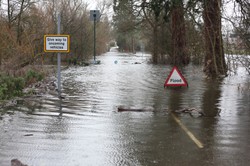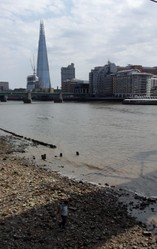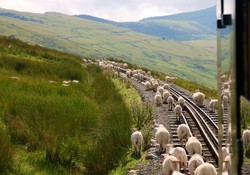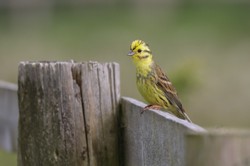I once walked the lonely and beautiful Honister Pass with my father, as we took a long hike down Newlands Valley through Buttermere and Borrowdale, a treasured time with a now deceased parent. It was a dry summer day, but we knew the reputation of the place for rain, and in recent years the area has exceeded all the worst expectations. The village at the foot of the pass, Seathwaite, is known as England's rainiest place, and a year or so ago it recorded 31.6 centimetres in a day, but yesterday exceeded this unwanted record, with the rain at Honister pouring 34.6 centmetres in 48 hours on the lonely road through the hills. The water cascaded down both sides of the pass, on one side descending to lake Buttermere, and the other down to lake Derwentwater in Borrowdale, where the town of Keswick, near the isthmus between Derwentwater and Veronica's beloved Bassenthwaite, suffered some flooding.
But Keswick was not the most badly hit. Down to the south in Kendal parts of the town were flooded, and an elderly man was swept to his death in the swollen river Kent. Many families had to be evacuated from their homes,power was lost, and the local member of parliament, the leader of the Liberal Democrats, had to escape from his flooded and now to be written off car, leading four children to safety in the process. But north of this, the river Eden burst its banks and overflowed into the town of Carlisle, swollen with water that had rolled off the Pennine hills.Sadly, even though the government had improved flood defences in the town after flooding two or three years ago, the new defences were overwhelmed in places, such was the severity of the rain. Sixty thousand homes across the North West lost power as the electricity failed.
But the rest of Britain did not escape the attack. In London a ninety year old man was blown into the path of a bus to become the first fatality of the storm. In Southern Scotland a whole side of a street crumbled into a river. And I was anxious, but later relieved, as I knew that in Wales my son-in-law was driving home from a business trip through the storm to Anglesey, only an hour's drive across the Lleyn Peninsula, lovely by day, but dark and lonely in a storm at night. Sometimes if there is a bad storm the police shut the bridges to the Isle of Anglesey, so I did not want him stuck overnight in a car waiting at the bridge. But he reached home safe, but tired without delay.The police are not being unreasonable in shutting the two bridges, as such as the strength of the wind across the Menai straits that lorries have been known to topple, and cars and pedestrians could be blown into the metal framework.
The problem is that climate change predictions are that there will be an increase in Winter storms in North West Britain,and we are seeing it now. The rainfall in winter is growing heavier, fueled by the temperature rise in the Atlantic, just as this heat fuels hurricanes in North America. Climate change is real, dangerous, expensive and happening. I know that storms of great severity happen elsewhere in the world, and we cannot equal America's hurricanes, but we are not on a continent, but a crowded island, and if certain parts suffer economic damage, the whole island will suffer; and there is nowhere to run to.









 Darkness over the Earth the skies darkened when Jesus was crucified23 days ago
Darkness over the Earth the skies darkened when Jesus was crucified23 days ago
 TheThousand Year Gardenon 11/26/2025
TheThousand Year Gardenon 11/26/2025
 Women of the Gospelson 10/11/2025
Women of the Gospelson 10/11/2025
 Religious Gardenson 08/25/2025
Religious Gardenson 08/25/2025




Comments
It is a way of saying that the weather is very changeable, but it is not literally true
It is a way of saying that the weather is very changeable, but it is not literally true
Thank you for your comment below, in answer to my previous observation and question.
Your description of west Ireland as an all-wet "place where you get four seasons in a single day" intrigues me.
Is that just one four-season day in the year or is each day a four-season incident?
Probably, but I don't know it.I suspect that Scotland's rainiest place is near Cape Wrath on the North West tip. BlaenaeFfestiniog just at thevsouthern edge of Snowdonia is renowned for rain and has a claim for the honour. As for Ireland,the whole of the west is wet.it is said to be a place where you get four seasons in a single day.
The first paragraph to your first subheading, The extent and severity of the storm, describes Seathwaite as "rainiest place" in England.
Would there be a place even rainier in Ireland, Scotland or Wales?
Any expatriate Scots in the USA will be saddened to know that East Scotland has been badly hit in the last few days, the county of Aberdeen to be precise. Police are talking about threats to life and in some cases advising evacuation till the flood passes.
We have just had to cancel a trip to see my daughter and her husband in Anglesey, North Wales, as she sent a message saying, "Don't come, the main coastal road is flooded."
Just to keep people updated, there is yet another storm approaching Cumbria, though a smaller one. For the first time in peacetime COBRA, the government's emergency committee, is meeting on Christmas Day, which shows the level of concern. The meeting is at 10 Downing Street,the Prime Minister's official residence.
What's more, I was one who suggested that the army be drafted in for emergency road repairs to the main route through Cumbria, but we have discovered that no road repairs can happen until the hillside above the road is stabilized, as it has slipped and is threatening a landslide. When the repairs will be finished we just don't know.
This is interesting and relevant information.
Recent occurrences of landslide and frequent phenomenon of floods are man-made. Recent disasters in Uttarakhand in India were the result of deforestation. Populating the religious shrines for commercial purposes, building hotels and lodges near the banks of river, baring the mountains of trees were the true cause of the major devastation that resulted in huge losses of lives.
Chennai was recently flooded and the causes are being explored. Politicians are justifying and manipulating as usual, for their benefits. I agree with you on strategizing and planning for catastrophes. Every time we end up calling the Army when the local authorities are unable to handle them. The shabby and shoddy urbanization has to be checked somewhere, some time.